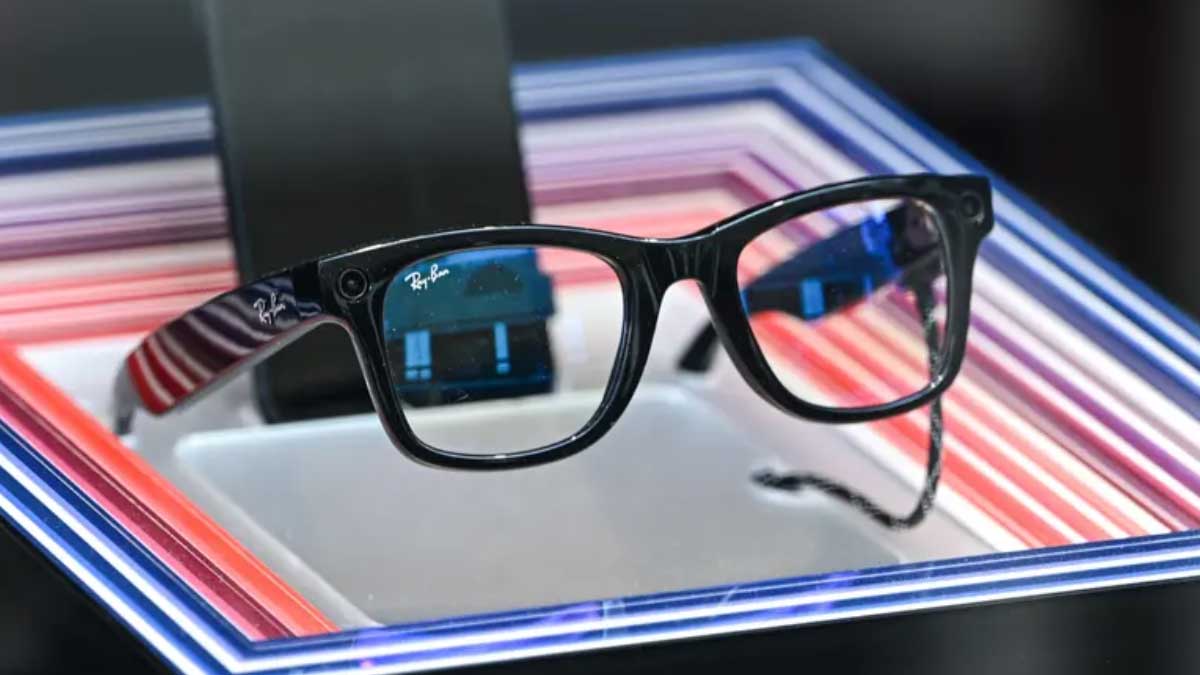- Home
- Billionaires
- Investing Newsletters
- 193CC 1000
- Article Layout 2
- Article Layout 3
- Article Layout 4
- Article Layout 5
- Article Layout 6
- Article Layout 7
- Article Layout 8
- Article Layout 9
- Article Layout 10
- Article Layout 11
- Article Layout 12
- Article Layout 13
- Article Layout 14
- Article Sidebar
- Post Format
- pages
- Archive Layouts
- Post Gallery
- Post Video Background
- Post Review
- Sponsored Post
- Leadership
- Business
- Money
- Small Business
- Innovation
- Shop
Recent Posts
Meta’s Smart Glasses: The Next Step in Audio Personalization

Meta Platforms, the parent company of Facebook, Instagram, and WhatsApp, is reportedly on the brink of revolutionizing how we interact with audio technology through innovative smart glasses that could tailor audio content based on users’ moods and biometric data. This ambitious concept is detailed in a recent patent filing uncovered by the tech-focused site, Wareable, which sheds light on Meta’s plans to integrate advanced biometric sensors into the next generation of smart glasses or mixed reality headsets.
According to the patent, Meta’s proposed system aims to create a more personalized listening experience by responding dynamically to changes in a user’s physiological conditions. These adjustments would occur based on various biometric readings, including heart rate, blood pressure, and even subtle shifts in vocal tone. Such capabilities could pave the way for a truly immersive audio experience that adapts to how a user feels in real time.
The patent outlines the integration of biometric sensors that would continuously monitor vital signs to generate what Meta calls a “communication energy score.” This score serves as a gauge of the user’s emotional and physical state. For instance, during high-intensity workouts, a user’s heart rate may increase, prompting the device to select an energetic playlist that matches the workout’s demands. Conversely, if the biometric data indicates heightened stress—perhaps indicated by a spike in blood pressure or a noticeable change in the user’s voice tone—the device could automatically shift to softer, calming music designed to promote relaxation and stress relief.
One of the most compelling aspects of this technology is its potential for automation. As outlined in the patent, users would not need to manually adjust their audio settings; instead, the smart glasses would intelligently interpret their physiological signals and adjust the audio accordingly. This hands-free experience could enhance the utility of smart glasses, allowing users to focus on their activities without the distraction of fiddling with music selections.
The concept of mood-responsive audio isn’t entirely new; however, Meta’s approach could significantly enhance existing technologies. Currently, many audio devices and apps offer some level of customization, but these systems often require manual input. Meta’s patent suggests a more integrated solution, potentially changing the way we interact with audio technology in our daily lives.
Meta’s exploration into wearable technology is part of a broader trend towards integrating health and wellness features into consumer electronics. The company’s previous foray into smart glasses, exemplified by the Ray-Ban Stories, has already set a foundation for audio capabilities within eyewear. These smart glasses allow users to listen to music, take calls, and interact with their devices through voice commands. However, the proposed mood-based audio adjustments could elevate the smart glasses’ functionality, creating a more immersive and personalized user experience.
It’s essential to consider how this technology might be implemented in practice. While Meta has yet to confirm the incorporation of biometric sensors into future smart glasses, there is speculation that these devices could potentially pair with existing wearable technologies, such as smartwatches or fitness trackers. Such companion devices could collect the necessary biometric data and relay it to the smart glasses, ensuring a seamless interaction that prioritizes user experience.
The development of these mood-responsive audio features aligns with Meta’s broader strategic goals. Recently, the company launched the Quest 3 mixed reality headset, which emphasizes enhanced spatial audio experiences. By further developing audio technologies that respond to the user’s emotional and physical states, Meta could position itself at the forefront of the wearable tech market.
While the specifics of when or if this technology will be commercially available remain uncertain, the implications are noteworthy. The ability to combine health data with audio customization could herald a new era of wearable tech that is not only functional but also deeply attuned to users’ emotional needs.
Moreover, as Meta continues to explore these innovative avenues, the possibility of smart glasses that transcend traditional audio playback grows increasingly likely. Imagine a world where your eyewear not only plays your favorite tracks but also intuitively senses when you need a pick-me-up or a moment of calm. Such advancements could redefine user interaction with audio devices, merging health monitoring and personalized entertainment in unprecedented ways.
In conclusion, Meta’s potential development of mood-responsive audio technology in smart glasses represents an exciting shift toward more personalized, health-aware wearable tech. By leveraging biometric data to tailor audio experiences, Meta is poised to offer users a sophisticated tool that enhances both enjoyment and well-being. As the company delves deeper into this promising technology, the smart glasses of the future may become essential companions that intuitively respond to our bodies and emotions, fundamentally transforming how we experience sound.
Recent Posts
Categories
- 193cc Digital Assets2
- 5G1
- Aerospace & Defense45
- AI33
- Arts3
- Banking & Insurance11
- Big Data3
- Billionaires308
- Boats & Planes1
- Business315
- Careers13
- Cars & Bikes74
- CEO Network1
- CFO Network17
- CHRO Network1
- CIO Network1
- Cloud10
- CMO Network18
- Commercial Real Estate7
- Consultant1
- Consumer Tech171
- CxO1
- Cybersecurity59
- Dining1
- Diversity, Equity & Inclusion4
- Education7
- Energy8
- Enterprise Tech29
- Events11
- Fintech1
- Food & Drink2
- Franchises1
- Freelance1
- Future Of Work2
- Games141
- GIG1
- Healthcare77
- Hollywood & Entertainment175
- Houses1
- Innovation41
- Investing2
- Investing Newsletters4
- Leadership65
- Lifestyle11
- Manufacturing1
- Markets20
- Media189
- Mobile phone1
- Money13
- Personal Finance2
- Policy554
- Real Estate1
- Research6
- Retail1
- Retirement1
- Small Business1
- SportsMoney30
- Style & Beauty1
- Success Income1
- Taxes2
- Travel10
- Uncategorized8
- Vices1
- Watches & Jewelry2
- world's billionaires278
Related Articles
Save Up to $1,000 on iPhone 16 Pro Max with Trade-In
Black Friday discounts on iPhones are hard to come by, though not...
By 193cc Agency CouncilDecember 1, 2024Creative Pebble X Plus: Versatile Desktop Audio Upgrade
The Creative Pebble X Plus speaker system is an excellent solution for...
By 193cc Agency CouncilNovember 30, 2024GoChess Mini: Bridging Online Chess and Real-Board Play
Online chess has grown immensely in popularity over recent years, fueled in...
By 193cc Agency CouncilNovember 30, 2024Galaxy S25 Slim vs. iPhone 17 Air: Ultra-Thin Showdown
The race for the slimmest smartphone is intensifying, with Apple and Samsung...
By 193cc Agency CouncilNovember 30, 2024















Leave a comment